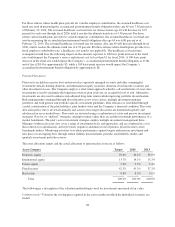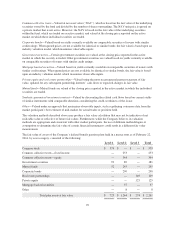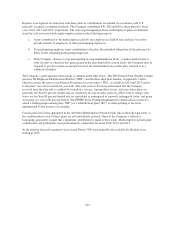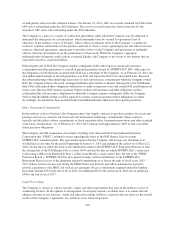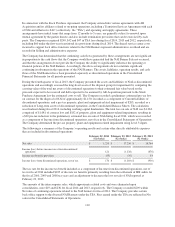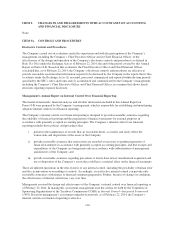Albertsons 2014 Annual Report Download - page 109
Download and view the complete annual report
Please find page 109 of the 2014 Albertsons annual report below. You can navigate through the pages in the report by either clicking on the pages listed below, or by using the keyword search tool below to find specific information within the annual report.In September 2008, a class action complaint was filed against the Company, as well as International Outsourcing
Services, LLC (“IOS”), Inmar, Inc., Carolina Manufacturer’s Services, Inc., Carolina Coupon Clearing, Inc. and
Carolina Services, in the United States District Court in the Eastern District of Wisconsin. The plaintiffs in the
case are a consumer goods manufacturer, a grocery co-operative and a retailer marketing services company who
allege on behalf of a purported class that the Company and the other defendants (i) conspired to restrict the
markets for coupon processing services under the Sherman Act and (ii) were part of an illegal enterprise to
defraud the plaintiffs under the Federal Racketeer Influenced and Corrupt Organizations Act. The plaintiffs seek
monetary damages, attorneys’ fees and injunctive relief. The Company intends to vigorously defend this lawsuit,
however all proceedings have been stayed in the case pending the result of the criminal prosecution of certain
former officers of IOS.
In December 2008, a class action complaint was filed in the United States District Court for the Western District
of Wisconsin against the Company alleging that a 2003 transaction between the Company and C&S Wholesale
Grocers, Inc. (“C&S”) was a conspiracy to restrain trade and allocate markets. In the 2003 transaction, the
Company purchased certain assets of the Fleming Corporation as part of Fleming Corporation’s bankruptcy
proceedings and sold certain assets of the Company to C&S which were located in New England. Since
December 2008, three other retailers have filed similar complaints in other jurisdictions. The cases have been
consolidated and are proceeding in the United States District Court for the District of Minnesota. The complaints
allege that the conspiracy was concealed and continued through the use of non-compete and non-solicitation
agreements and the closing down of the distribution facilities that the Company and C&S purchased from each
other. Plaintiffs are seeking monetary damages, injunctive relief and attorneys’ fees. On July 5, 2011, the District
Court granted the Company’s Motion to Compel Arbitration for those plaintiffs with arbitration agreements and
plaintiffs appealed. On July 16, 2012, the District Court denied plaintiffs’ Motion for Class Certification and on
January 11, 2013, the District Court granted the Company’s Motion for Summary Judgment and dismissed the
case regarding the non-arbitration plaintiffs. Plaintiffs have appealed these decisions. On February 12, 2013, the
8th Circuit reversed the District Court decision requiring plaintiffs with arbitration agreements to arbitrate and
the Company filed a Petition with the 8th Circuit for an En Banc Rehearing. On June 7, 2013, the Eighth Circuit
denied the Petition for Rehearing and remanded the case to the District Court. On October 30, 2013, the parties
attended a District Court ordered mandatory mediation which was not successful in resolving the matter. On
November 21, 2013, the Eighth Circuit held a hearing on plaintiffs’ appeal from the Class Certification denial
and Summary Judgment decisions. The Eighth Circuit took the matter under advisement. On December 13, 2013,
the District Court granted the Company’s motion to stay the proceedings at the District Court pending a decision
on the second Eighth Circuit appeal regarding class certification and summary judgment.
In May 2012, Kiefer, a former Assistant Store Manager at Save-A-Lot, filed a class action against Save-A-Lot
seeking to represent current and former Assistant Store Managers alleging violations of the Fair Labor Standards
Act related to the fluctuating work week method of pay (“FWW”) in the United States District Court in the
District of Connecticut. FWW is a method of compensation whereby employees are paid a fixed salary for all
hours worked during a week plus additional compensation at one-half the regular rate for overtime hours. Kiefer
claimed that the FWW practice is unlawful or, if lawful, that Save-A-Lot improperly applied the FWW method
of pay, including in situations involving paid time off, holiday pay, and bonus payments. In March 2013, the
United States District Court granted conditional certification in favor of Kiefer on the issue of whether Save-A-
Lot properly applied the FWW. In May 2013, the United States District Court denied Save-A-Lot’s motion for
summary judgment on the same issue. This FWW practice is permissible under the Fair Labor Standards Act and
other state laws, and Save-A-Lot denied all allegations in the case. The same plaintiffs’ attorneys representing
Kiefer filed two additional FWW actions against Save-A-Lot and SUPERVALU. Shortly before filing of the
Kiefer lawsuit, in one of these cases filed by a former Assistant Store Manager (Roach) in March 2011, the
Superior Court for the Judicial District of Hartford at Hartford granted summary judgment in favor of Save-A-
Lot determining FWW was a legal practice in Connecticut. In March 2013, another Save-A-Lot Assistant Store
Manager (Pagano) filed an FWW class claim against SUPERVALU under Pennsylvania state law in the
Philadelphia County Court of Common Pleas relating to overtime payment. In all three cases, which the
Company was defending vigorously, plaintiffs were seeking monetary damages and attorneys’ fees. On
107



